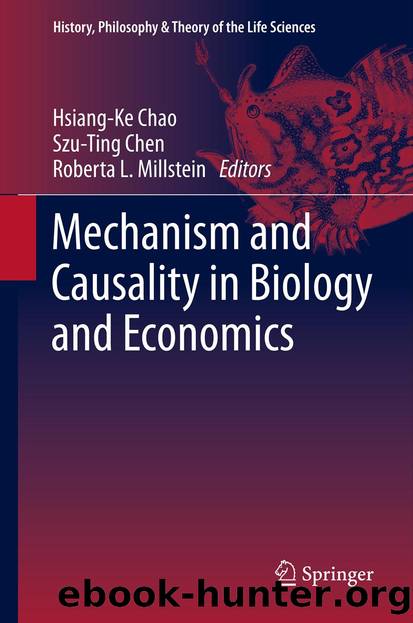Mechanism and Causality in Biology and Economics by Hsiang-Ke Chao Szu-Ting Chen & Roberta L. Millstein

Author:Hsiang-Ke Chao, Szu-Ting Chen & Roberta L. Millstein
Language: eng
Format: epub
Publisher: Springer Netherlands, Dordrecht
2 Leuridan’s Thesis
In his title, Leuridan asks, “Can mechanisms really replace laws of nature?” He answers, “No.” In fact, Leuridan’s positive thesis is much weaker than this title suggests.
Before formulating this weaker claim, it is necessary first to clear up some terminology. Leuridan defines laws as “generalization[s] describing a regularity, not some metaphysical entity that produces or is responsible for that regularity” (2010, fn 1). This definition ignores three traditional distinctions that have brought much-needed clarity to the discussions of laws in the philosophy of science. First, we distinguish laws (metaphysical entities that produce or are responsible for regularities) and law statements (descriptions of laws). If one does not respect this distinction, one runs the risk (as Leuridan does) of unintentionally suggesting that sentences, equations, or models are responsible for the fact that certain stable regularities hold. In like fashion, we distinguish regularities, which are statistical patterns of dependence and independence among magnitudes, from generalizations, which describe regularities. Finally, we distinguish regularities from laws, which produce or otherwise explain the patterns of dependence and independence among magnitudes (or so one might hold).
Let us now reconstruct Leuridan’s real thesis. First, Leuridan endorses the ground rule of our discussion. Strict law statements, as Leuridan understands them, are nonvacuous, universally quantified, and exceptionless statements that are unlimited in scope, apply in all times and places, and contain only purely qualitative predicates (2010, p. 318). Noting that few law statements in any science live up to these standards, Leuridan argues that the focus on strict law statements (and presumably also on strict laws) is unhelpful for understanding science. Instead, he focuses on the concept of a pragmatic law (or p-law). Following Sandra Mitchell (1997, 2000, 2003, 2009), Leuridan understands p-law statements as descriptions of stable and strong regularities that can be used to predict, explain, and manipulate phenomena. A regularity is stable in proportion to the range of conditions under which it continues to hold and to the size of the space-time region in which it holds (2010, p. 325). A regularity is strong if it is deterministic or frequent. p-law statements need not satisfy the criteria for strict law statements. Thus, Leuridan’s question is not whether mechanisms can replace laws, simpliciter. Rather it is whether mechanisms can replace p-laws and, correlatively, whether descriptions of mechanisms can replace p-law statements in our thinking about science.
Yet Leuridan’s thesis is narrower still. He distinguishes two “kinds” of mechanism: complex system mechanisms (cs-mechanisms) and Salmon/Railton mechanisms. Leuridan characterizes cs-mechanisms as stable configurations of robust objects that produce stable behaviors (2010, p. 319; see also Glennan 2002, pp. 344–46).1 Leuridan does not define Salmon/Railton mechanisms, except to say that they involve causal processes and causal interactions (2010, p. 319). However, if we follow Glennan, they might be understood as “sequences of interconnected events” or “a chain or web of events leading to a particular event” such as “a boy hit a baseball; the baseball ricocheted off the tree and crashed into the window” (Glennan 2002, p. 345). Salmon/Railton mechanisms are singular causal chains.
Download
This site does not store any files on its server. We only index and link to content provided by other sites. Please contact the content providers to delete copyright contents if any and email us, we'll remove relevant links or contents immediately.
International Integration of the Brazilian Economy by Elias C. Grivoyannis(111039)
The Radium Girls by Kate Moore(12022)
Turbulence by E. J. Noyes(8041)
Nudge - Improving Decisions about Health, Wealth, and Happiness by Thaler Sunstein(7696)
The Black Swan by Nassim Nicholas Taleb(7114)
Rich Dad Poor Dad by Robert T. Kiyosaki(6616)
Pioneering Portfolio Management by David F. Swensen(6294)
Man-made Catastrophes and Risk Information Concealment by Dmitry Chernov & Didier Sornette(6013)
Zero to One by Peter Thiel(5792)
Secrecy World by Jake Bernstein(4746)
Millionaire: The Philanderer, Gambler, and Duelist Who Invented Modern Finance by Janet Gleeson(4472)
The Age of Surveillance Capitalism by Shoshana Zuboff(4286)
Skin in the Game by Nassim Nicholas Taleb(4243)
The Money Culture by Michael Lewis(4201)
Bullshit Jobs by David Graeber(4182)
Skin in the Game: Hidden Asymmetries in Daily Life by Nassim Nicholas Taleb(3995)
The Dhandho Investor by Mohnish Pabrai(3761)
The Wisdom of Finance by Mihir Desai(3739)
Blockchain Basics by Daniel Drescher(3577)
